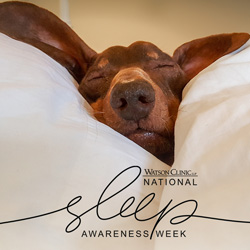 Sleep is essential to your physical and mental health, helping your body repair itself and your brain process memories of the day's events. And considering you spend up to a third of your life sleeping, that slumber time should count!
Sleep is essential to your physical and mental health, helping your body repair itself and your brain process memories of the day's events. And considering you spend up to a third of your life sleeping, that slumber time should count!
Below, we bust some sleep myths to pave the way for ultimate snoozing.
Myth: Naps can make up for lost sleep.
Fact: A siesta is reenergizing, but it can't replace a good night's sleep, because a nap doesn't move you through the essential stages of sleep you get with a full night of sleep. Nap smart by limiting your snooze to 30 minutes or less and by dozing earlier in the afternoon so the nap doesn't interfere with your bedtime.
Myth: You'll sleep better If you exercise at night.
Fact: Exercise can help you sleep, but earlier in the day might be best. Why? Exercise can be stimulating and raise your core body temperature, making it tougher to sleep if it's too close to your bedtime. If you're not a morning person, don't ditch exercise altogether; instead, aim to complete vigorous exercise at least one to two hours before turning in. If that's impossible, light stretching or yoga may be more beneficial.
Myth: A nightcap will help you sleep more soundly.
Fact: Alcohol makes you tired and can help you doze off more quickly—at first. But as it works its way through your body, alcohol produces chemicals that interfere with the quality of your sleep. Alcohol can also worsen snoring; increase your risk for obstructive sleep apnea (a potentially serious medical condition); and cause a reduction in rapid eye movement (REM) sleep, when most dreaming occurs.
Myth: Older people need less sleep.
Fact: Not necessarily. This misconception might be due to the fact that as we age, sleep is more fragmented, caused by disorders like insomnia or sleep apnea. Most adults, regardless of age, need between seven and nine hours of sleep each night.
Myth: Turning on the TV will help you doze off.
Fact: While a TV can initially lull you to sleep, it's changing volume and lighting can jolt you awake and interfere with a solid slumber. A better bet: Tune out the TV and turn on a fan or sound machine instead for a dose of steady background noise.
Watson Clinic’s Sleep Disorders Center was one of the first sleep labs in the state. If you’re one of the 70 million Americans who suffer from some degree of sleep deprivation, ask your primary care provider for a referral or call 863-680-7627 for more information.
Sources: American Academy of Sleep Medicine; National Institute of Neurological Disorders and Stroke; Sleep Foundation